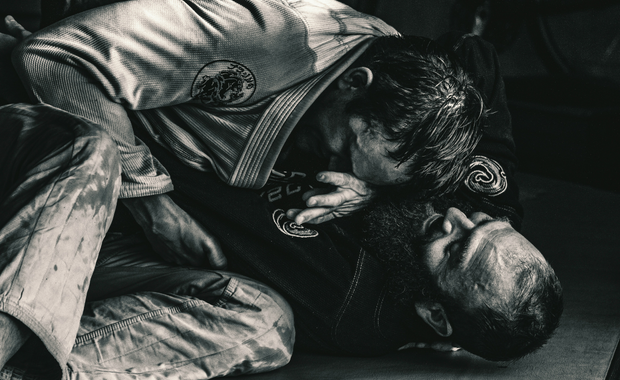Motivation
(Video) Georges St-Pierre – Knocking Out Your Failures & Fighting For Success

3X Canadian Athlete of the year and one of the best Mixed Martial Artists of this generation being only beaten a couple of times in his career and finishing most of his opponents off with a knockout, Georges St Pierre has made a name for himself in the ranks of the UFC (Ultimate Fighting Championship) and around the world.
In this post Georges St-Pierre shares with us his training methods, what motivates him to win and some useful advice that you can take on not only in the ring but in anything you are striving for in your everyday life to accomplish what most would call the next to impossible.
Georges St-Pierre says he’s at his best when he’s under pressure.
And with his impending fight against Matt Serra for the Welterweight Championship, which will be their second matchup (and the most highly anticipated on top of it). Find out how Georges St-Pierre’s workout uses a variety of techniques and tactics to stay on top of his opponent, including MMA (mixed martial arts), a rigorous diet and keeping a positive attitude.
Exercise
“I always train with better wrestlers than me, better boxers than me, better jujitsu guys than me,” Georges St-Pierre says. “When you train with people who are better than you, it keeps challenging you. By challenging me it makes me better. It makes you better develop your skills than someone who is always training with the same people over and over again. I have a very good team.
“When I go there [other training gyms] I play their game. When I wrestle a guy like David Zimmerman, I don’t have the best of him… I wrestle well but not the best of him. But when I get into the sport and have myself in a takedown position, the guy that I’m fighting isn’t a guy like Zimmerman. It’s the same thing in boxing, jujitsu, Muay Thai. So that’s why I try to train in every single discipline with the best guys.”
Training Routine
“Normally, when I don’t have a fight coming up, I always train,” Georges St. Pierre explains. “I train six days a week, two training sessions a day. I box, go the gym and I have a lot of great training partners. I train with guys who are going to the Olympics, and I train with some of the best jujitsu guys in the world. In every type of training I do, I train with better guys than me so I always develop my skills. “When I have a fight, and the fight is getting closer, let’s say a month before the fight, I don’t train by just boxing, or just wrestling. I train more MMA, and what I mean by that is I make training partners come here and I mix all the training together, like kickboxing, submission, takedown on the ground, to really give me the reflex and the momentum for the fight. “I do boxing, wrestling, Muay Thai, jujitsu — that’s the four disciplines that I do. I also do sprinting and strength-conditioning. “If you want to be a tough MMA fighter, you have to have a background in something.
I started with karate, some people are very successful in wrestling, some others in tae kwon do… There isn’t a better style — that’s a lie. There is better person but not a better style. Karate was the perfect sport for me to start with, but maybe for another person it would be kung fu or judo. It all depends on what you love to do. If you’re good at it, it’s because you love what you’re doing.”
Diet
“I tend to eat as well as I can, but I use the diet to lose weight,” Georges St-Pierre says. “I weigh 185 pounds, and I have to be 170 on the scale [for the weigh-in], so in four days I’m going to lose 15 pounds. I’m gonna cut down the carbs, the sodium, and I’ll be eating a lot of greens and a lot of protein. By doing so, I’m going to restrict myself and make the weight. And after the weigh-in, I’m going to do the opposite by eating a lot of carbs and get all my weight back.
“My favorite food is tourtiere, a French Canadian dish, but unfortunately I can’t eat that when I’m cutting my weight down. It’s going to be for after the fight. My mother makes the best tourtiere in the world.”
Mindset
Georges St-Pierre says he trained differently for this fight than he did for previous matchups against Matt Serra. “I trained really smartly,” Georges St-Pierre explains. “Mentally, everything is going well. I’m at the top of my game right now. “It’s funny to me because it seems we’re in the same situation but the scenario is reversed. Last year when I was fighting Matt Serra, I was coming off of an injury and Matt Serra was coming from a winning streak. He beat me. He was a better man that night. And now this time it’s the other way around — he’s coming from a back injury and I’m coming from a winning streak. I think it’s going to make a big difference. Battles are won by momentum and I think the momentum is quite different [this time].”
Training With A New Goal
Georges St-Pierre continues, “After my first fight with Matt Serra, I was training with one thing in mind: get my revenge. It was the only thing I had in mind. I was not focusing on the guy I was going to fight; I was focusing on getting my revenge against Matt Serra. I was working with a sports psychologist and he said, ‘You haven’t released your brick.’ That’s what he told me. And it was true. I didn’t accept the fact that I had lost. I just wanted to jump in the ring and get my revenge, when in reality I had two fights to go before getting to Matt Serra. “So, [the psychologist] says to me, ‘You haven’t released your brick.’ He made me grab a brick and he said, ‘Carry a brick for one day and it’s not so bad. At first it’s not heavy. But if you carry it on your back every day, every single minute of your life, it’s going to get heavy. So you better get rid of it and look for what’s important to you.’ “He made me get a brick and I wrote ‘Matt Serra’ on it, and he said, ‘When you are ready to release that brick and look to the future, you’re going to take this brick and throw it into the river.’ It sounds stupid but that’s what I did.
I think it helped me to release a lot of the negative energy that I had. Instead of focusing, I kept my eyes off of the goal. So now I’m focused again on the goal. I think this helped me a lot.”GSP III: The Battle of Champions
GSP III: The Battle of Champions
Become An Ultimate Athlete
Training, for Georges St-Pierre, involves a wide range of important criteria that doesn’t begin and end with purely exercise. This UFC ultimate athlete uses a calculated combination of training, diet and mindset to overtake his competitors. And it is with this training regimen that Georges St-Pierre hopes to take back the Welterweight Championship this weekend.
The Best George St. Pierre Motivational Video
http://www.youtube.com/watch?v=V2cghwbpdsM
One minute with Georges St-Pierre
Life
10 Research-Backed Steps to Create Real Change This New Year
This New Year could finally be the one where you break old patterns and create real, lasting change.

Every New Year, we make plans and set goals, but often repeat old patterns. (more…)
Life
How Sports Quietly Build Kids’ Emotional Intelligence And Why It Matters for Life
Sports create a natural loop of awareness and action that kids carry into real life

A missed shot in basketball. A tumble during a gymnastics routine. A tough loss in karate sparring. These moments can feel huge to a child, sparking frustration, embarrassment, or even tears. (more…)
Did You Know
7 Surprising Life Lessons Video Games Taught Me That School Never Did
Want to get better at something? Study the pros. That applies to both life and video games

If you play video games, you’ll quickly discover you’re not alone. You’ll meet people who share your interests, challenge your skills, and even teach you something new about yourself. I started gaming when I was 10. A classmate invited me to play after school, and I was hooked. (more…)
Featured
The Psychology of Motivation: How to Keep Moving Forward Every Day
Discover how daily habits, self-discipline, and a few clever strategies can spark your drive and focus.

You wake up on a typical Monday morning, glance at your clock, and realize it’s time to get moving. How do you summon that inner drive to deal with your responsibilities with a genuine smile on your face? (more…)
-

 News2 weeks ago
News2 weeks agoBrandon Willington Builds 7-Figure Business by Ignoring Almost Everything
-

 Health & Fitness3 weeks ago
Health & Fitness3 weeks agoWhat Minimalism Actually Means for Your Wellness Choices
-

 Did You Know3 weeks ago
Did You Know3 weeks agoWhy Most Online Courses Fail and How to Fix Them
-

 Business3 weeks ago
Business3 weeks agoIf Your Business Internet Keeps Letting You Down, Read This
-

 Business1 week ago
Business1 week agoEntrepreneur’s Guide to Pay Stubs: Why Freelancers and Small Business Owners Need a Smart Generator
-

 Business1 week ago
Business1 week agoThe Salary Shift Giving UK Employers An Unexpected Edge
-

 Business1 week ago
Business1 week agoThe Simple Security Stack Every Online Business Needs
-

 Scale Your Business1 week ago
Scale Your Business1 week ago5 Real Ways to Grow Your User Base Fast






























4 Comments